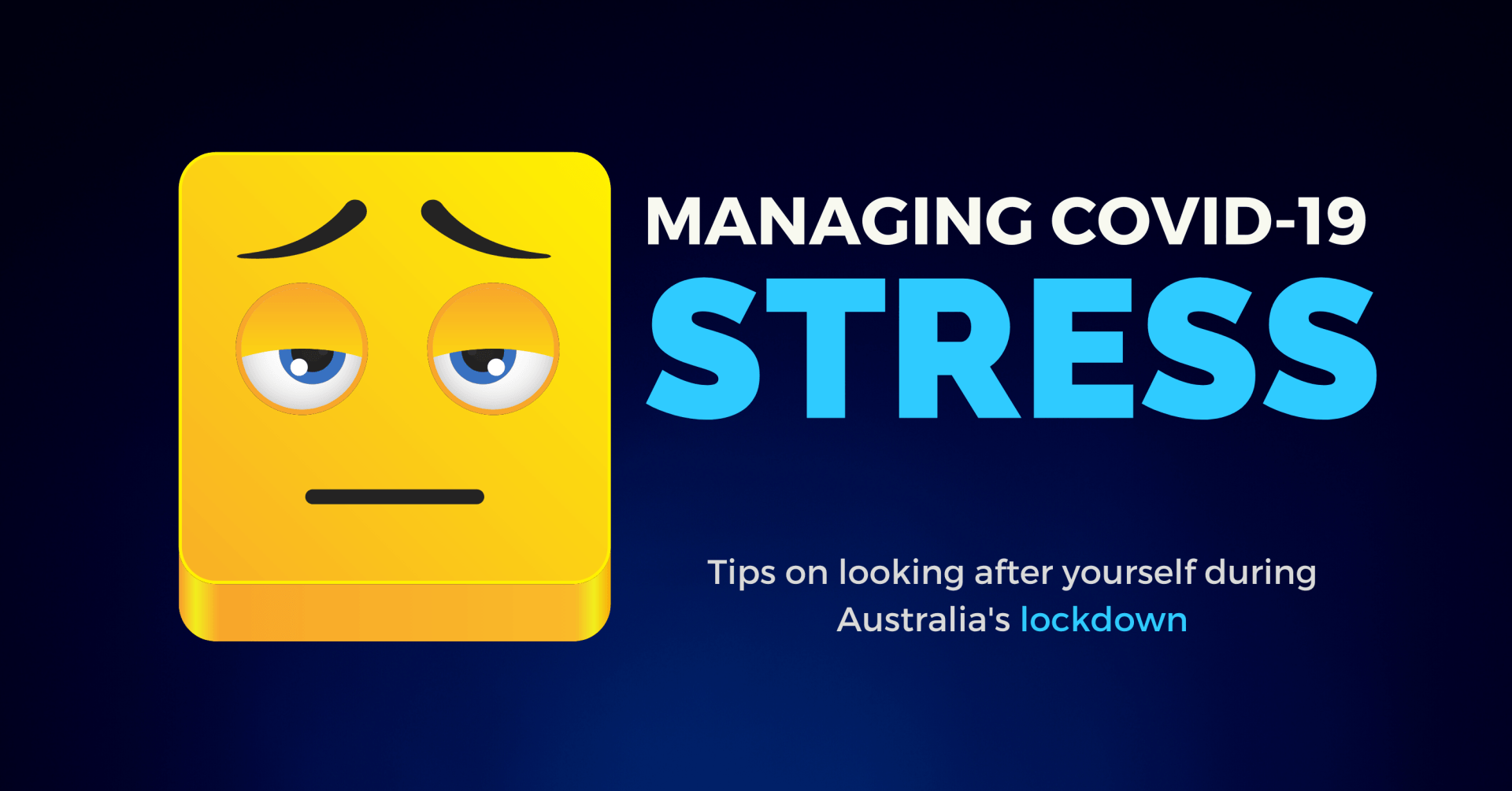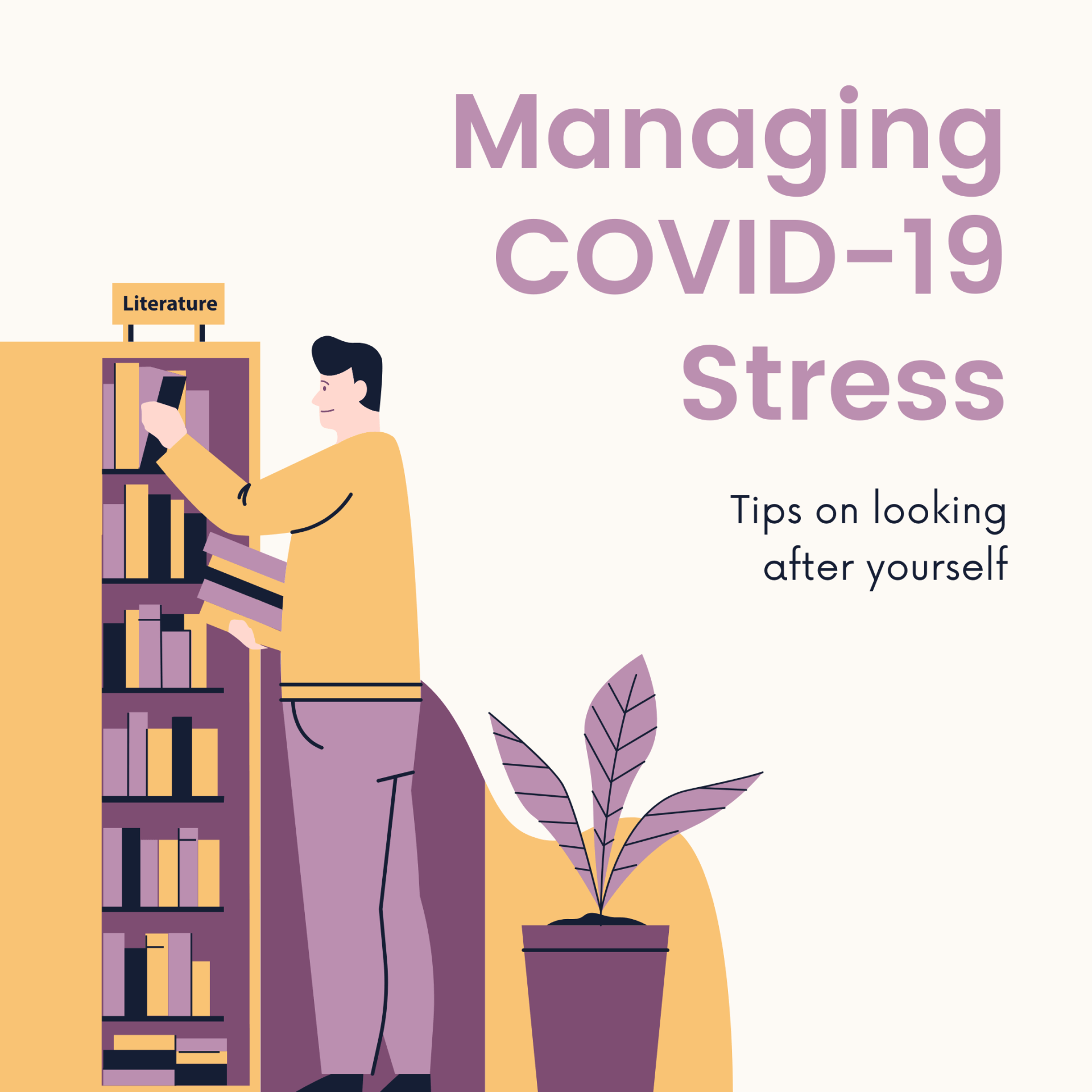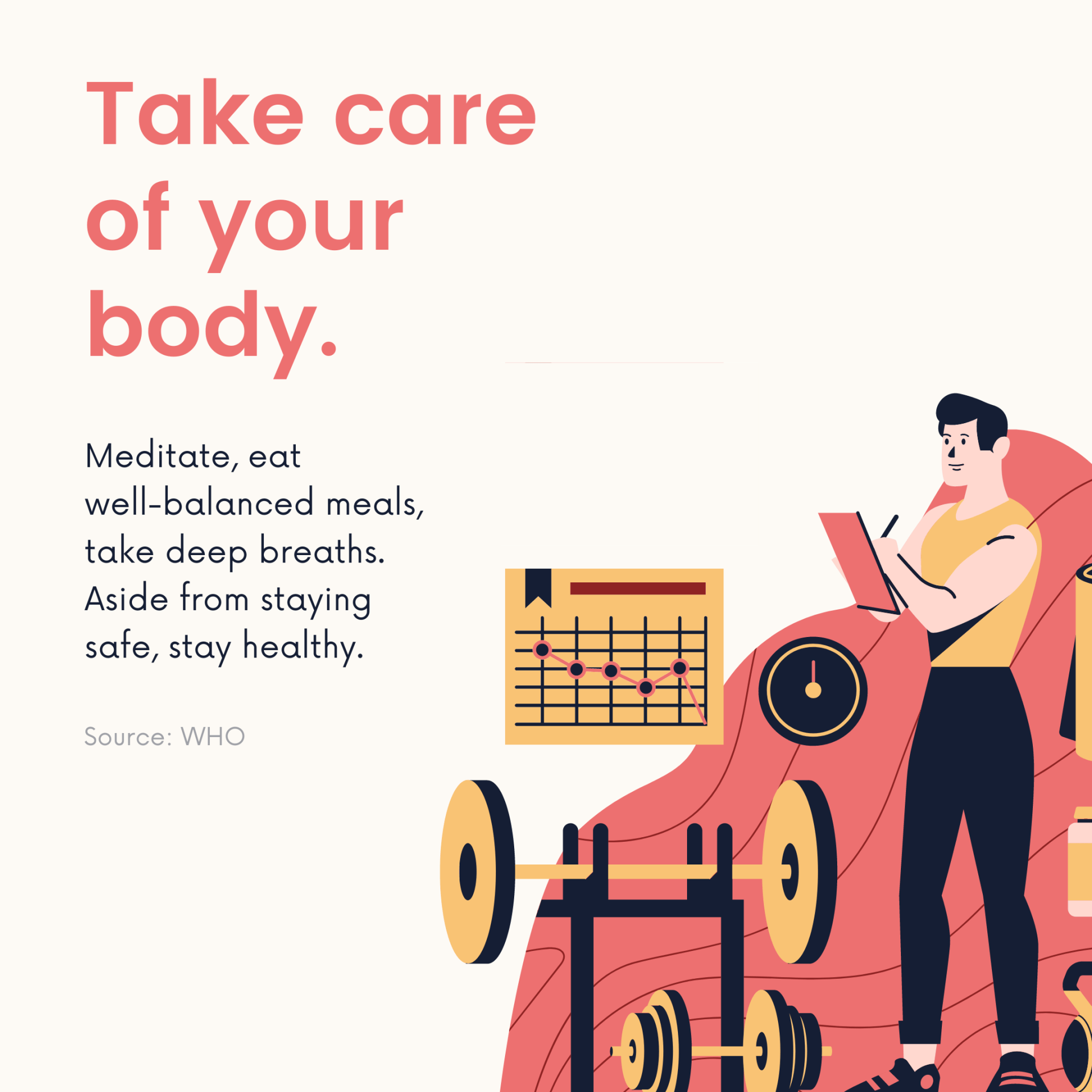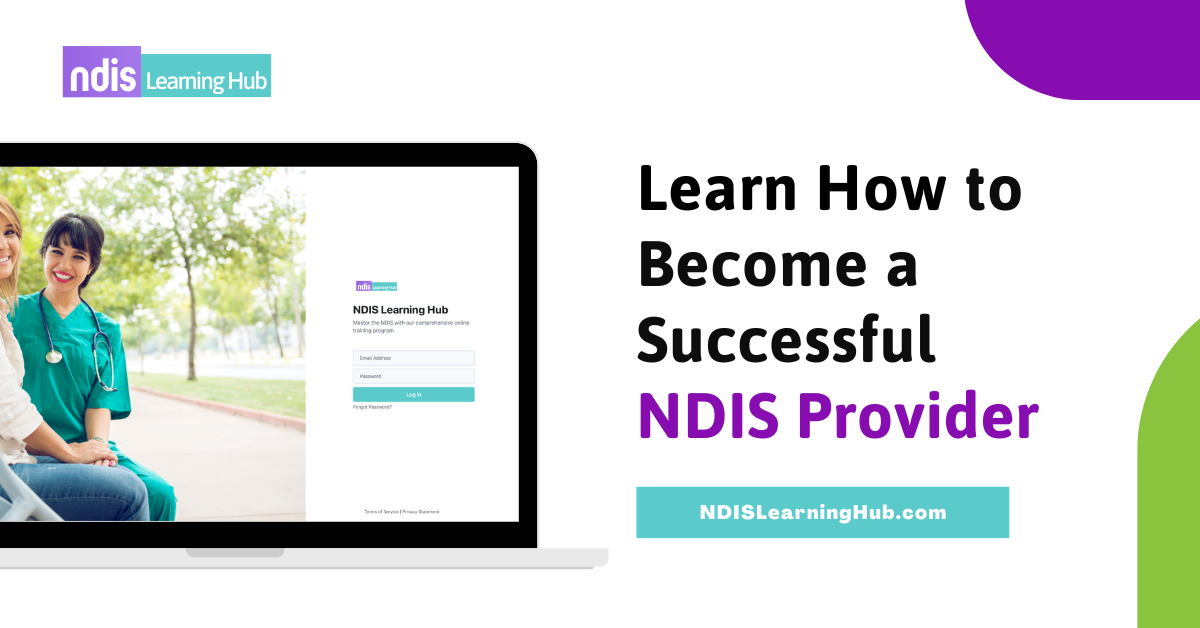Ray Breslin • April 4, 2020
Q&A: Keeping Fit and Healthy During Coronavirus Lockdown
Manage the stress & anxiety of the COVID-19 lockdown. Here are some tips you can follow

Why do we need physical activity?
Regular physical activity benefits both the body and mind. It can reduce high blood pressure, help manage weight and reduce the risk of heart disease, stroke, type 2 diabetes, and various cancers. It also improves bone and muscle strength and increases balance, flexibility and fitness. For older people, activities that improve balance help to prevent falls and injuries. For children, regular physical activity helps support healthy growth and development and reduce the risk of disease in later life, and through regular activity, children can develop fundamental movement skills and build social relationships.
Regular physical activity also improves mental health and can reduce the risk of depression, cognitive decline and delay the onset of dementia - and improve overall feelings of wellbeing.
How much physical activity is recommended?
WHO has detailed recommendations on the amount of physical activity people of all ages should do to benefit their health and wellbeing. (available here for children under age of 5 and here for youth, adults and olders) Here are the minimum levels we recommend:
Infants under the age of 1 year need to
- be physically active several times a day.
Children under 5 years of age
- should spend at least 180 minutes a day in physical activities, with 3-4 year-olds being moderately or vigorously active for an hour a day.
Children and adolescents aged 5-17years
- all children and adolescents should do at least 60 minutes a day of moderate to vigorous-intensity physical activity, including activities that strengthen muscle and bone, at least 3 days per week.
Adults aged over 18 years
- should do a total of at least 150 minutes of moderate-intensity physical activity throughout the week, or at least 75 minutes of vigorous-intensity physical activity throughout the week, including muscle-strengthening activities 2 or more days per week.
- older adults with poor mobility should do physical activity to enhance balance and prevent falls on 3 or more days per week.
But any physical activity is better than none. Start with small amounts and gradually increase duration, frequency and intensity over time.
Being active during the COVID-19 pandemic is challenging for us all. Because the opportunities to be physically active seem to be more restricted, it is even more important to plan in every day the ways to be active and to reduce the time spent sitting for long periods. Put simply, it is a critical time to ensure we all move more and sit less.
How do I stay safe while exercising in this COVID-19?
Do not exercise
if you have a fever, cough and difficulty breathing. Stay home and rest, seek medical attention and call in advance. Follow the directions of your local health authority.
If you are able to go for a walk
or bicycle ride always practice physical distancing and wash your hands with water and soap before you leave, when you get to where you are going, and as soon as you get home. If water and soap are not immediately available, use alcohol-based hand rub.
If you go to a park or public open space
to walk, run or exercise always practice physical distancing and wash your hands with water and soap, before you leave, when you get to where you are going, and as soon as you get home. If water and soap are not immediately available, use alcohol-based hand rub. Follow the directions of your local health authority in regards to any restrictions on the number of people with you and/or restrictions on the use of public outdoor play or exercise equipment.
If you are not regularly
active start slowly and with low intensity activities, like walking and low impact exercises. Start with shorter amounts, like 5-10 minutes, and gradually build up to 30 minutes or more continuously over a few weeks. It is better and safer to be active for short periods more frequently than to try and be active for long periods when you are not used to it.
Choose the right activity
so that you reduce the risk of injury and that you enjoy the activity. Choose the right intensity according to your health status and fitness level. You should be able to breath comfortably and hold a conversation while you do light- and moderate-intensity physical activity.
How do I stay active around the house?
Try and reduce long periods of time spent sitting, whether for work, studying, watching TV, reading, or using social media or playing games using screens. Reduce sitting for long periods by taking short 3-5 minute breaks every 20-30 minutes. Simply stand up and stretch or even better, take a walk around the house, up and down the stairs, or into the garden. By just moving around and stretching you can improve your health and wellbeing. For more ideas and illustrations of healthy stretches see here.
Set up a regular routine to be active every day,
by planning a physical activity or exercise break either by yourself, by joining an online class, or by setting up a time to be active online with your friends or colleagues. Making a specific time to be active helps ensure you get your daily physical activity. Put the time in your diary, and it will help remind you. Stick with it, as this will help you build a regular routine, and help you adjust to new ways of working, study and family life under COVID-19 restrictions
Be active with your family
and friends, connecting with others can help you and your family in the home and elsewhere spend time together and be active. Planning time to be active with your children with active games at home, walks in the parks, or cycling can be a way the whole family can relax, be together and be active and healthy whilst at home.
Set yourself and your family
be active goals, by choosing a specific type of activity, time of day and/or number of minutes you will do every day. Get each family member to choose their own goal which sets a bit of a challenge but is realistic with help from family or friends and motivation. Record your progress on a weekly activity chart and, if you think it would help, reward yourself with something you value.
More physical activity ideas to help you stay active
For Infants under 1 year of age
- Spend regular time doing floor-based play with your baby in a prone position (‘tummy time’) and spread this throughout the day while baby is awake.
For Children under 5 years of age
- Active play in and around the home – invent games which involve being active and can develop skills in throwing, catching, kicking, as well as developing posture and balance.
- Active play and games where children get out of breath, such as running around, skipping and jumping.
For Children and adolescents aged 5 - 17 years
- Active games and active play with family.
- Join in online active games or activity classes, also look for online physical education classes as well as exercise routines suitable for adolescents.
- Set up playground games indoors such as Jump rope and hop-scotch – make up new games and challenges that involve being active.
- Learn a new skill – for example try an learn to juggle.
- Encourage doing some muscle strength training activities such as lifting weights or use improvised weight such as bottles full of water or sand.
For Adults
- Climb up the stairs as much as you can, think of it as an opportunity to be active.
- Use household chores as a way to be more physical activity.
- Join in an online exercise class or make up your own routine to music you enjoy that uses the major muscle groups and raises you heart rate.
- Do some muscle strengthening activities such as lifting weights or improvise using full bottles of water or simply use your own body weight and do sets of press ups, sit ups and squats.
- Make time for fun, such as dancing to music.
Source: https://www.who.int/news-room/q-a-detail/be-active-during-covid-19
Limited Time Offer
Become a Successful NDIS Provider
$689 $349
Use code EARLY349 at checkout
News Feed

In an event that has captured the attention of boxing enthusiasts and casual fans alike, the bout between Mike Tyson and Jake Paul stands as a testament to the ever-evolving nature of combat sports. With Netflix and Most Valuable Promotions at the helm, this clash has garnered an unprecedented viewership, with estimates suggesting that up to 65 million viewers are poised to witness history in the making. The match-up pits the seasoned ferocity of Tyson against the youthful dynamism of Paul, promising a spectacle laden with intensity and intrigue. The anticipation has been building steadily, fueled by a series of well-orchestrated promotional activities that have highlighted the stark contrasts between the two fighters. The involvement of Netflix and Most Valuable Promotions not only signifies the magnitude of this event but also underscores the changing landscape of boxing entertainment. The promise of 65 million viewers tuning in is indicative of the global interest in this unique confrontation, setting the stage for what could be one of the most memorable moments in boxing history. Before the Bell Tolls: The Prelude As the hours dwindle down to the moment of truth, the atmosphere surrounding the Mike Tyson vs Jake Paul fight is electric. The journey to this point has been paved with intense training regimes, strategic planning, and psychological warfare, all culminating in a showdown that transcends the traditional boundaries of the sport. Both fighters, aware of the stakes, have immersed themselves in preparations that have tested their limits, physically and mentally, setting the tone for a battle that is as much about skill as it is about willpower. The Hype Machine: Pre-Fight Press Conferences The pre-fight press conferences have served as a battleground of their own, with both Mike Tyson and Jake Paul engaging in verbal sparring that has captivated audiences worldwide. These events have not only amplified the excitement but have also provided insights into the fighters' mindsets. Tyson's seasoned calm contrasts sharply with Paul's confident bravado, offering a glimpse into their respective strategies and how they perceive the challenge ahead. Countdown to Clash: Mike Tyson vs Jake Paul Dynamics In the final countdown to the clash, the dynamics between Mike Tyson and Jake Paul continue to evolve. Tyson, with his legendary power and experience, faces a competitor in Paul who brings a fresh, albeit less experienced, perspective to the ring. This juxtaposition of attributes has fueled endless debates among fans and analysts alike, each trying to predict the outcome of a fight that defies easy categorization. The anticipation is palpable, as the world awaits to see how these dynamics will play out under the bright lights. The Main Event: Mike Tyson vs Jake Paul The air is thick with anticipation as Mike Tyson and Jake Paul step into the ring, marking a pivotal moment in boxing history. This encounter, a blend of experience and youth, power and agility, tradition and innovation, is more than just a fight; it's a spectacle that has captured the imagination of millions. As the bell rings, the eyes of the world are locked on this historic battle, eager to witness the unfolding of a new chapter in the annals of boxing. Other Noteworthy Clashes Aside from the headline-grabbing bout between Jake Paul and Mike Tyson, the undercard featured compelling matchups that caught the attention of fight fans globally. Mario Barrios and Abel Ramos squared off in a match that promised fireworks, while Neeraj Goyat and Whindersson Nunes also stepped into the ring, bringing their unique backgrounds into the boxing spotlight. These fights added depth to an already star-studded event, showcasing the diverse talent within the sport. Mario Barrios vs Abel Ramos In an eagerly anticipated contest, Mario Barrios and Abel Ramos went toe-to-toe in a bout that lived up to expectations. Both fighters displayed exceptional skill and determination, trading blows in a closely contested match. The fight was a testament to their resilience and dedication to the sport, further elevating the excitement surrounding the event. Neeraj Goyat vs Whindersson Nunes Neeraj Goyat and Whindersson Nunes provided a fascinating clash of styles and backgrounds. Goyat, with his solid boxing foundation, faced off against Nunes, who brought his own unique approach to the ring. The bout was a highlight of the undercard, offering fans a glimpse into the global reach of boxing and its appeal across different cultures and disciplines. The Technicalities and Controversies The bout between Jake Paul and Mike Tyson, while a spectacle, was not without its technicalities and controversies. Questions were raised about the ruleset, the age difference between the fighters, and the streaming platform's ability to handle the event. Despite these challenges, the fight drew a massive global audience, showcasing the enduring appeal of both boxers and the sport itself. Setting the Rules: The Framework of the Fight Setting the stage for this historic encounter, the rules were carefully crafted to ensure a fair and competitive match. The framework included the agreement on two-minute rounds, a nod to the exhibition nature of the bout. This decision highlighted the event's unique blend of entertainment and sport, allowing both fighters to showcase their skills under conditions that respected their differences in experience and age. Technical Troubles: Netflix's Streaming Struggles Despite the anticipation surrounding the Jake Paul vs Mike Tyson fight, Netflix faced technical issues , struggling to provide a seamless streaming experience for the 74 million live viewers globally. The platform's difficulties underscored the challenges of broadcasting such a high-profile event, affecting some fans' ability to watch the match live. The Weight of Words: Altercations and Age Differences The build-up to the fight was punctuated by verbal jousts and discussions about the significant age gap between Jake Paul and Mike Tyson. These altercations and differences added layers of intrigue to the event, raising questions about the impact of experience versus youth in the ring. Beyond the Ring: What It Means The aftermath of the Jake Paul vs Mike Tyson fight extended far beyond the final bell. Press conferences and public reactions revealed the event's impact on the boxing world and beyond, sparking debates about the future of exhibition bouts and the role of celebrity fighters within the sport. The Aftermath: Press Conferences and Public Reactions Following the bout, press conferences and public reactions highlighted the mixed feelings surrounding the event. While some praised the entertainment value and the spotlight it brought to boxing, others debated the implications for the sport's integrity. The diverse reactions underscored the event's significance in bridging traditional boxing with the modern era of celebrity-driven matches. The Ripple Effect: Impact on Future Boxing Events The Jake Paul vs Mike Tyson fight set a precedent that could influence the future of boxing events. Its success in drawing a massive audience and generating widespread media attention has opened discussions about the potential for similar matchups, blending entertainment with the sport in new and innovative ways. Wrapping Up: Legacy of Mike Tyson vs Jake Paul The Jake Paul vs Mike Tyson bout will be remembered as a historic encounter that blurred the lines between sports and entertainment. Drawing 74 million live viewers globally and sparking widespread interest, it demonstrated the massive appeal of high-profile matchups. This event has undoubtedly left a lasting mark on the boxing landscape, suggesting a future where similar events could become more commonplace. A Historic Encounter: Reflecting on the Event's Significance The fight between Jake Paul and Mike Tyson was more than just a boxing match; it was a historic event that captured the world's attention. Reflecting on its significance, it's clear that the bout transcended the sport, merging the worlds of entertainment, sports, and digital streaming in a way never seen before. Its legacy will likely influence the organisation of future boxing events and the broader sports entertainment industry. What's Next for Mike Tyson and Jake Paul? After the dust has settled, the future paths for Mike Tyson and Jake Paul remain subjects of speculation. For Tyson, the fight added another chapter to his legendary boxing career, while for Paul, the victory over Tyson has opened new doors, potentially including more high-profile boxing bouts or ventures into mixed martial arts. The impact of this event on both fighters' careers and the sport of boxing will be watched with keen interest.

Jake Paul , also known as 'The Problem Child', has swiftly transitioned from a well-known internet personality to a controversial yet undeniably compelling figure in professional boxing. His decision to enter the ring has not only shocked many but has also sparked a significant interest in influencer boxing, a trend his brother Logan Paul , along with KSI and Joe Weller , had initiated. With a boxing record standing at 11-1 as of 2024, excluding his amateur outings, Jake Paul has faced a variety of opponents, showcasing his prowess and dedication to the sport. Throughout his boxing journey, Paul has encountered both victory and defeat, with his only loss coming from a split decision against Tommy Fury in February 2023. Despite this setback, Paul's victories, including significant wins over figures like Anderson Silva and Ben Askren , have solidified his position in the boxing world. Each match, whether against seasoned fighters or fellow influencers, has contributed to his evolving fight record, drawing attention from boxing enthusiasts and casual viewers alike. An Introduction to Jake Paul's Boxing Journey Born in Cleveland, Ohio, on January 17, 1997, Jake Paul embarked on his professional boxing career at the age of 23. He made a splash in the boxing scene with his debut against Ali Eson Gib on January 30, 2020 , where Paul defeated Gib via a first-round technical knockout (TKO). This victory marked the beginning of Paul's journey in pro boxing, setting the stage for future high-profile fights against opponents like Anderson Silva and Tyron Woodley, among others. Transition from Entertainment to Boxing The shift from a successful entertainment career to professional boxing was a bold move for Jake Paul. His boxing debut in 2020 signified a significant change, not just in his career but in his physicality as well, with a noticeable increase in muscle mass and training intensity. His decision to enter the boxing ring was met with scepticism by some, but Paul's dedication to the sport and his impressive 11-1 record, including seven knockouts, has gradually silenced many critics. The split decision loss to Tommy Fury in February 2023 has been a pivotal moment in Jake Paul's boxing narrative, underscoring the challenges and triumphs that have defined his journey so far. Early Career Highlights and Training From his very first match against Ali Eson Gib, where Paul secured a victory through a technical knockout, it was clear that he was taking his transition into boxing seriously. This early win laid the foundation for his burgeoning boxing career, demonstrating his commitment to rigorous training and preparation. As Paul continued to face and defeat more experienced opponents, each victory served not only as proof of his growing skills but also as milestones in his unconventional path within the sport. Key Influences on Jake Paul's Boxing Career The influences on Jake Paul's boxing career are as varied as they are impactful. From the early encouragement of his brother and fellow influencer, Logan Paul, to the mentoring by seasoned professionals within the boxing community, each has played a part in shaping his approach to the sport. Additionally, Paul's engagement with high-profile fighters and trainers has further honed his technique and strategic thinking, making his transition into boxing a unique blend of entertainment and athleticism. In-Depth Analysis of Jake Paul's Boxing Record Jake Paul's evolution from a social media influencer to a pro boxer is encapsulated in his fight record. With twelve professional fights to his name, Paul has secured eleven wins, showcasing his ability to contend with and triumph over a diverse range of opponents. This record is a testament to his hard work, strategic planning, and the sheer unpredictability he brings to the sport of boxing. Breakdown of Jake Paul's Wins and Losses Embarking on his boxing career, Jake Paul has accumulated an impressive record of wins and a solitary defeat. Each match has been a learning experience, contributing to his growth as a boxer. Paul's boxing career, marked by strategic victories and a notable loss to Tommy Fury, highlights his resilience and determination to succeed in the competitive world of boxing. Notable Victories and What They Mean Throughout his boxing journey, Jake Paul has secured several notable victories that have significantly impacted his career. Wins against seasoned athletes and fighters have not only improved his record but also helped legitimise his presence in the boxing world. Each victory has brought with it a deeper understanding of the sport and a greater appreciation for the discipline it requires. Jake Paul's First Defeat: The Tommy Fury Fight The bout against Tommy Fury in February 2023 stands as Jake Paul's first professional defeat. This loss, by split decision, was a pivotal moment in Paul's boxing career, offering valuable lessons and a chance to reassess and refine his approach to the sport. Despite the setback, it has fueled his determination to come back stronger, proving that each fight, win or loss, is an integral part of his boxing journey. High-Profile Fights and Their Impact Jake Paul's boxing career has been marked by several high-profile engagements that have not only tested his skills but also significantly raised his profile within the boxing community. Fights against well-known figures such as Ben Askren, Tyron Woodley, Anderson Silva, and the legendary Iron Mike have not only drawn massive attention but have also served as critical milestones in Paul's career. These matches, against both former champions and fellow influencers, demonstrate the broad appeal and cross-over potential that Paul brings to the sport. The Ben Askren Fight: A Turning Point The match against Ben Askren was a turning point in Jake Paul's boxing career. Venturing into the boxing ring against a former mixed martial artist and wrestler, Paul's victory via knockout was a statement to the world about his serious commitment and capability within the sport. This fight not only boosted his credibility as a boxer but also underscored the diverse challenges he's willing to face and overcome. Engagements with Fighters like Tyron Woodley and Anderson Silva Engagements with fighters such as Tyron Woodley and Anderson Silva have been instrumental in shaping Jake Paul's boxing career. These matches against seasoned fighters have tested Paul's skills, resilience, and ability to adapt to different fighting styles. Each fight has contributed to his growth as a boxer, offering invaluable experience and exposure to high-level competition. The Anticipated Clash with Mike Tyson The anticipated clash with Mike Tyson, known as Iron Mike, stands as one of the most pivotal moments in Jake Paul's boxing career. Facing off against a world champion and boxing legend, Paul's engagement in this fight underscores the remarkable journey he has undertaken in the sport. It signifies not only the height of his ambitions but also the broadening scope of influencer boxing as a legitimate and compelling facet of professional boxing. The Significance of Jake Paul's Boxing Style Jake Paul's foray into professional boxing has been characterised by a distinctive style that sets him apart from traditional boxers. His unconventional entry into the sport, combined with a unique blend of athleticism and entertainment, has challenged norms and captivated audiences worldwide. As Paul continues to evolve and refine his style, he remains a figure of intrigue and discussion in the boxing community. How Jake Paul's Technique Differs from Traditional Boxers Jake Paul's technique in the boxing ring diverges from that of traditional boxers in several key ways. His background in entertainment and social media, coupled with a relentless work ethic and dedication to training, has resulted in a unique approach to fighting. This blend of flair and skill has not only defined his style but has also contributed to the spectacle and appeal of his matches, attracting a new audience to the sport of boxing. Training Regimen and Preparation for Fights Jake Paul's boxing preparation involves a rigorous training regimen that is tailored to improve his strength, agility, and boxing skills. His workouts include a mix of boxing drills, sparring sessions, and physical conditioning to ensure he is at his peak for each fight. The focus is on enhancing his punching power and endurance, critical components of his boxing record. Paul's Strategies Against Diverse Opponents In facing opponents with varied backgrounds, Jake Paul's boxing strategy is meticulously planned for each fight. His team analyses the fighting style of his adversaries to tailor a specific game plan that maximises Paul's strengths while exploiting his opponent's weaknesses. This strategic approach has been pivotal in maintaining his impressive boxing record. Jake Paul Outside the Ring Jake Paul's impact extends beyond the ring, where his entrepreneurial spirit and digital savviness have made significant marks. His ventures and promotions contribute to his brand, making him a prominent figure in both the boxing and digital worlds. Business Ventures and Promotions Paul's knack for business has seen him launch ventures that complement his boxing career, enriching his brand's value and appeal. Most Valuable Promotions and Its Role in Boxing Most Valuable Promotions , co-founded by Jake Paul, plays a crucial role in the boxing industry by promoting fights that capture massive public interest. It not only highlights Paul's knockouts in his career but also his strategic acumen, seen in the split decision to Tommy Fury, showcasing his influence beyond just fighting. Digital Presence and Influence on Boxing Popularity Jake Paul leverages his extensive digital presence to generate unprecedented attention towards boxing, introducing the sport to a younger, digital-savvy audience. His ability to stir interest through social media platforms has significantly contributed to the sport's growing popularity among new demographics. Controversies and Public Perception Paul's career is not without its controversies, impacting public perception and adding layers to his persona. Legal Issues and Their Effects on Jake Paul's Career While legal issues have posed challenges, Jake Paul has navigated these waters, ensuring they minimally impact his career trajectory. His team's management of these situations reflects the complexity of maintaining a high-profile career amidst public scrutiny. The Impact of Public Image on Fight Promotions Jake Paul's public image, punctuated by controversies, plays a significant role in fight promotions. His ability to remain in the spotlight ensures that each fight garners significant attention, contributing to his boxing record's prominence. The Future of Jake Paul in Boxing The future looks promising for Jake Paul in boxing, with potential high-profile fights on the horizon that will challenge his skills and possibly enhance his legacy in the sport. His record and ambition suggest an exciting path ahead, filled with opportunities to cement his status in boxing history. Upcoming Fights and Potential Opponents Speculation about future opponents keeps fans eager for what's next in Jake Paul's boxing journey. Jake Paul Vs. The Boxing World: What's Next? As Jake Paul continues to challenge himself against more experienced boxers, the question of what's next remains intriguing. His determination to face top-tier opponents signals his commitment to the sport and his desire to leave a lasting impact. Legacy and What Jake Paul Aims to Achieve Jake Paul's aspirations in boxing go beyond just winning fights; he seeks to leave a legacy that transcends the sport. His journey from internet personality to professional boxer is a testament to his ambition and the mark he aims to make in boxing history. Behind Every Punch: Understanding Jake Paul's Boxing Odyssey From his debut to facing seasoned fighters, Jake Paul's boxing odyssey is a compelling narrative of transformation and ambition, showcasing his evolution from internet personality to a respected boxer who continuously defies expectations. Evolution from Internet Personality to Professional Boxer Jake Paul's transition from an internet sensation to a professional boxer is marked by significant milestones, including notable wins that highlight his growth in the sport. This journey underscores his adaptability and determination to succeed in the competitive boxing arena. The Role of Media and Spectacle in Jake Paul's Fight Record Jake Paul's boxing record isn't just a list of fights; it's a series of events that have captured the world's attention, thanks in large part to the media and spectacle surrounding them. Each match, promoted with a blend of traditional boxing hype and modern digital marketing savvy, has turned Paul's bouts into must-see spectacles. This unique approach has not only broadened the audience for boxing but has also sparked debates about the future of the sport in the digital age. Analysing Jake Paul's Contribution to Modern Boxing Jake Paul has undeniably left his mark on modern boxing, not just through his personal achievements in the ring but also through his influence on the sport's culture and economy. By bridging the gap between entertainment and athleticism, Paul has introduced boxing to a younger, digital-first audience. His knack for showmanship, combined with a serious approach to training and competition, challenges traditional perceptions of boxing, suggesting a new model for how fighters can engage with fans and build their careers in the 21st century.

John Ibrahim, a name synonymous with Sydney's nightlife, is often portrayed as a charismatic nightclub owner with ties to the underworld. But beyond the headlines and popular media portrayals, there's much more to uncover about this enigmatic figure. Here are ten lesser-known facts about John Ibrahim that might just surprise you. His Humble Beginnings John Ibrahim was born into a world far removed from the vibrant nightlife of Sydney's Kings Cross. His story begins in the small town of Tripoli, Lebanon, where he spent the early years of his life until civil unrest uprooted his family. They migrated to Australia in 1970, seeking safety and new opportunities. Settling in the working-class suburb of Merrylands, Ibrahim's childhood was characterized by modesty and struggle—a far cry from the opulent lifestyle he would later lead. John Ibrahim's biography details how these early experiences shaped his resilience and ambition. The transition to Australia came with its own set of challenges. The language barrier and cultural differences made integration into Australian society difficult for the young boy. Despite these hurdles, Ibrahim was determined to make a name for himself. Growing up in Merrylands, he was often reminded of what he didn't have—which increased his hunger for success. It was here, amidst the stark realities of immigrant life, that Ibrahim's journey from obscurity to fame began. Those who knew him during his formative years often describe a young man with an indomitable spirit. His early forays into business were humble, to say the least. Legend has it that Ibrahim's entrepreneurial spirit was sparked when he began selling clothes from the boot of his car—a story that, if true, would surely make him the most stylish bootlegger in Merrylands! Life in the suburbs taught Ibrahim valuable lessons about resourcefulness. An astute observer of human behavior, he quickly identified opportunities where others saw none. By the time he moved to the bustling heart of Sydney, he had developed a keen sense for business and a reputation for being savvy. His ascent to becoming a prominent nightclub owner in Sydney , often referred to in the media as the "King of the Cross," was a testament to his tenacity and vision. "My journey wasn't about finding a pot of gold at the end of the rainbow. It was about building that rainbow from scratch," Ibrahim reportedly reflected on his rise from humble beginnings. While his story is often overshadowed by the controversies that surrounded his later years, the narrative of a young Lebanese boy transforming his life in a foreign land remains compelling. For those interested in learning more about Ibrahim's early days and rise to prominence, several resources provide in-depth insights into his journey . A Nightclub Empire Builder John Ibrahim is often recognized for his role as a prominent nightclub owner, but his journey from owning a single club to presiding over a sprawling nightlife empire is a testament to his formidable business acumen. Ibrahim's savvy entrepreneurship transformed Sydney's nightlife scene, making him a pivotal figure in the industry. In the late 1980s, John Ibrahim entered the nightclub business with the acquisition of Tunnel Nightclub in Kings Cross, an area that would become synonymous with his name. His instinctive understanding of what made a club successful—be it music, ambiance, or clientele—helped him curate unique experiences that attracted Sydney's elite. His business model emphasized not just entertainment, but creating an environment where patrons felt exclusive yet at ease. As he succinctly put it, "Creating a space where people can forget their troubles, if only for a night, was my goal." Expanding beyond Tunnel, Ibrahim's network soon included iconic venues like The Throb and Dragonfly, each contributing to his growing influence. His prowess wasn't just in owning clubs, but in synergizing them to form a nightlife network that resonated with diverse crowds across Sydney. This expansion reflected strategic thinking and a keen eye for trends, ensuring his venues stayed relevant amidst the city's ever-evolving nightlife landscape. It's worth noting that his empire-building wasn't devoid of challenges. The competitive nature of the nightlife industry and the dynamic nature of Kings Cross required Ibrahim to continually innovate and adapt. His ability to navigate these challenges often drew media attention, further solidifying his status in the public eye. For a deeper dive into his rise to fame and success, you can explore more about his net worth insights . Despite the controversies and media scrutiny, John Ibrahim's legacy as a nightclub empire builder remains impactful, with his story often chronicled in popular culture, including books and TV series that explore his life and career. His Portrayal in Popular Culture In the realm of Australian pop culture, few figures have been as captivatingly depicted as John Ibrahim. His life and the lore surrounding it have become synonymous with the glitzy yet gritty backdrop of Sydney's nightlife. Perhaps nowhere is this duality more evident than in the hit TV series, Underbelly: The Golden Mile, where Ibrahim's character is a central figure. While the series offers a tantalizing glimpse into the life of this infamous nightclub owner, it also blurs the lines between fact and fiction, leaving audiences guessing about the real man behind the myth. It's worth noting how Underbelly has cemented Ibrahim's status in Australian popular culture. The fictionalized narrative paints him as a charismatic yet enigmatic figure, a portrayal that has intrigued viewers and sparked discussions around water coolers and dinner tables alike. But what remains elusive is how much of this on-screen representation aligns with reality. "It's like watching a magic show," some say about Ibrahim's media portrayals, "You know some tricks are real, but you're left wondering about the rest." Beyond Underbelly, Ibrahim's life has inspired numerous other forms of media, including books and documentaries. His autobiography, Last King of the Cross , provides a firsthand account of his journey, offering insights that are often absent in dramatized versions. For those fascinated by the dichotomy of Ibrahim's public persona and his private life, his media representations offer a complex tapestry of stories. Whether it's through interviews, podcasts, or even public appearances, Ibrahim continues to captivate audiences who are eager to separate fact from fiction. As he once quipped in an interview, "The truth is often stranger than fiction, but fiction is where the fun is." For a more comprehensive look at the man, his lifestyle, and his business acumen, the untold stories of John Ibrahim might just hold the key to understanding this enigmatic figure who has left an indelible mark on Sydney's cultural landscape. His Written Word In a world where tales often get skewed by external narratives, John Ibrahim took control of his story through his autobiography, "Last King of the Cross." This riveting read serves as an unfiltered portal into the life of a man whose name has become synonymous with Sydney's vibrant yet notorious nightlife scene. Unlike the typical portrayal of Ibrahim, often seen through the lens of crime documentaries and tabloid headlines, his book offers a deeper understanding of the personal and professional facets that define him. Diving into the pages of "Last King of the Cross," readers can explore Ibrahim's journey from a young Lebanese immigrant to a prominent nightclub owner in Sydney's underworld . The book sheds light on his strategic business maneuvers and the personal relationships that influenced his path. Far from glorifying his controversial reputation, Ibrahim candidly addresses the challenges and triumphs that are often overshadowed by his media portrayal. Perhaps what surprises many is the candid humor with which Ibrahim approaches his life story. For instance, he doesn't shy away from sharing anecdotes that humanize him—often painting a picture of a man who is as much about family ties and loyalty as he is about the glitzy nightclub world. Readers are offered nuggets of wisdom and reflections that are both introspective and thought-provoking, challenging preconceived notions with every turn of the page. "The public image is often a façade, an illusion of what people want to see. My story is simply reality with all its complexities." Ibrahim's narrative not only captivates but educates, leaving readers with a nuanced understanding that goes beyond the sensationalism typically associated with his name. As an added bonus, for those intrigued by his financial acumen, insights into John Ibrahim's net worth offer a perspective on his rise to success in the competitive world of nightlife and entertainment. Behind the Headlines While John Ibrahim is often perceived through a lens tinted by crime and controversy, his own account paints a picture that is far from monochrome. According to Ibrahim, much of what the media portrays is sensationalized and exaggerated. He argues that the stories spun around his name often miss the nuances of his life, offering an insight into the world that thrives "behind the headlines." His journey from a Lebanese immigrant to a prominent nightclub owner in Sydney's Kings Cross is often overshadowed by the media's fixation on his alleged criminal connections. However, Ibrahim himself has often said, "I'm not what they say I am; I'm what I say I am," a statement that echoes his discontent with the public narrative (source: John Ibrahim Biography ). Delving into the complexities of his life, there's a narrative that focuses on family loyalty and business acumen. Despite facing numerous legal challenges and controversies, Ibrahim managed to build an empire that many find intriguing. His entrepreneurial journey, albeit controversial, showcases a resilience that is often left out of the public discourse. "The more they write, the more they get wrong," Ibrahim told reporters in a candid interview. His story is not just about the underworld connections and controversies but also about a strategic mind that navigated the murky waters of business in one of Sydney's most challenging areas. The media's fascination with Ibrahim often overlooks his contributions to the nightlife culture in Sydney, a facet that adds another layer to his already complex persona (source: John Ibrahim Net Worth Insights 2024 ). In exploring Ibrahim's life beyond the headlines, it becomes evident that the man behind the media's narrative is a tapestry of contradictions, much like the city he has called home for decades. As he navigates between being a family man and a reputed business figure, Ibrahim remains a key figure in Australia's cultural zeitgeist, drawing attention for reasons both warranted and otherwise. Family Ties John Ibrahim's family dynamics are intricately woven into the tapestry of his life, showcasing a blend of controversy and camaraderie. Despite the public's often lurid fascination with the Ibrahim clan, John has consistently demonstrated unyielding loyalty to his kin. His brothers, most notably Sam Ibrahim, have frequently captured media headlines, embroiled in various legal issues and notorious escapades. For instance, Sam, once a prominent figure in the Sydney underworld, has had his fair share of run-ins with the law, a fact that has not escaped public scrutiny. Read more about John Ibrahim's untold story . However, beneath the headlines and sensational stories lies a profound sense of family loyalty. John Ibrahim's relationship with his brothers, despite their legal woes, reflects a steadfast commitment to the notion of kinship. It's a relationship that underscores the age-old adage, "Blood is thicker than water," suggesting that familial bonds withstand the tests of time and circumstance. Moreover, John Ibrahim's family saga extends beyond the confines of the criminal underworld, delving into the cultural and personal realms. The Ibrahim family's Lebanese heritage adds layers to their complex narrative, highlighting the cultural values of loyalty and unity. In the midst of public controversies, John has often turned to his family for support, standing by them in times of adversity and triumph alike. His ability to maintain these strong familial ties, even in the face of adversity, is a testament to the values instilled in him from a young age. "Family... is not an important thing, it's everything." – Michael J. Fox As John navigates the intricate web of public perception and personal allegiances, his unwavering dedication to family remains a cornerstone of his identity. Despite the tumultuous media portrayal of the Ibrahim family, their story is one of resilience and solidarity, a reminder that beneath the glamour of the nightclub owner and the intriguing tales of the Sydney underworld, there exists a man deeply rooted in the love and loyalty of his family. Find out where Sam Ibrahim is now . His Influence in Kings Cross Dubbed the "King of the Cross," John Ibrahim's reputation in Kings Cross, Sydney, is as legendary as it is controversial. His name has become synonymous with the vibrancy and notoriety of this iconic district. With an uncanny business acumen and a knack for hospitality, Ibrahim's influence transformed Kings Cross into a pulsating epicenter of Sydney's nightlife. In the heyday of the 1990s and early 2000s, his venues were the place to be, attracting celebrities, socialites, and curious thrill-seekers alike. To understand the extent of his influence, one must look at the way Kings Cross evolved under his watchful eye. Where there was once a mere collection of nightclubs, Ibrahim saw the potential for a thriving cultural hub. His ability to anticipate trends and adapt quickly allowed him to maintain a dominant presence in an ever-changing social scene. According to reports, Ibrahim owned or had interests in numerous nightclubs, which were known for their high-energy atmosphere and exclusive clientele. These establishments didn't just provide a space for entertainment; they became cultural landmarks. Critics might argue that his reign over Kings Cross brought with it a fair share of controversies and legal challenges, yet there's no denying the indelible mark he left on Sydney's social fabric. His story is one that has often been explored in media, including the TV series "Underbelly: The Golden Mile," which dramatized his larger-than-life persona and influence. As quoted in his biography, Ibrahim once mentioned, "Kings Cross was a place where anything could happen, and often did. It was a microcosm of life itself—chaotic, vibrant, and unpredictable." This quote encapsulates the essence of Kings Cross during Ibrahim's era—a melting pot of excitement and unpredictability. His story continues to intrigue and captivate audiences, as reflected in various biographical accounts and media portrayals that explore his multifaceted life. A Resilient Public Figure Throughout the years, John Ibrahim has faced numerous legal battles and intense media scrutiny, yet he remains an undeniably resilient public figure. His tenacity in navigating these challenges is nothing short of remarkable. Often shrouded in controversy, Ibrahim has managed to maintain a reputation that is both notorious and enigmatic—a testament to his character and perseverance. Despite his connections to Sydney’s underworld, Ibrahim's ability to maintain a public persona is akin to walking a tightrope with grace. The complexities of his life have been documented in various media forms, including his biography, "Last King of the Cross" , which offers a glimpse into his tumultuous yet fascinating journey. His resilience is evident in the way he handles media portrayal. From his portrayal in the popular TV series "Underbelly" to countless headlines over the years, Ibrahim has learned to face the music with a stoic composure. It seems like he has taken the saying "There’s no such thing as bad publicity" to heart, managing to leverage the media attention to his advantage, or at the very least, maintain his business interests intact. In a world where public figures often falter under pressure, Ibrahim stands as an example of enduring resilience. As he once mentioned in an interview , handling these pressures is "just part of the job." “Resilience is not about being strong all the time. It’s about bouncing back after being knocked down,” Ibrahim has been quoted saying, reflecting his philosophy in dealing with life's hurdles. While some might see Ibrahim as a controversial figure tied to the underworld, others view him as a savvy businessman, navigating the choppy waters of media and public opinion with a certain finesse. This duality is what makes John Ibrahim such a captivating figure in Australian popular culture. Exploring His Personal Life While John Ibrahim's colorful public image often steals the spotlight, his personal life is a mosaic of quieter moments and treasured relationships. Despite his association with the bustling nightlife of Sydney and the infamous underworld, Ibrahim is a man who often seeks solitude away from the constant glare of the media. Those who know him intimately speak of a man deeply rooted in family values and personal connections. It's said that Ibrahim’s private gatherings often resemble heartfelt family reunions rather than the extravagant parties one might expect from a renowned nightclub owner. Indeed, his family, which includes his brothers, plays a pivotal role in his life. Sam Ibrahim, for instance, although having a tumultuous journey, shares a history with John that is both intricate and profound. Sam Ibrahim ’s story is one that intertwines with John's own narrative, highlighting a familial bond that endures despite the shadows of their past. In interviews, when prodded about his personal life, John Ibrahim has been known to quip humorously, "I save the drama for my club's dance floor, not my living room," a testament to his desire to keep his personal and professional realms distinct. His affinity for personal relationships doesn't just end with family. Friends describe him as someone who, despite his intense public persona, can become the life of a quiet dinner, often sharing anecdotes that sprinkle humor and wisdom in equal measure. “Ibrahim’s private life is like a well-guarded treasure chest, only opened for those who truly earn his trust,” a close associate once mentioned in an interview. This enigmatic blend of public flamboyance and personal discretion makes John Ibrahim a fascinating character, not just in the pages of his biography , but in the real-life stories shared by those who have had the privilege to know him beyond the headlines. As the man behind the myth, Ibrahim's personal life is a testament to the age-old adage: there's more than meets the eye. His Legacy and Future Endeavors As John Ibrahim looks to the future, his legacy continues to evolve. With new business ventures on the horizon, he remains a figure of intrigue and inspiration, continually shaping the perception of success and influence in Sydney. John Ibrahim is more than the sum of his controversies and media portrayals. His journey from humble beginnings to a prominent figure in Sydney's nightlife is a testament to his resilience and business acumen. As we delve deeper into his life, we discover a multifaceted individual whose story continues to captivate and surprise.










